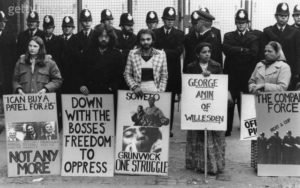Spycops and Strikers: From Grunwick to Now
 Spycops and Strikers is a public event in London on 15th February, part of a series of Grunwick 40 memorial events.
Spycops and Strikers is a public event in London on 15th February, part of a series of Grunwick 40 memorial events.
In 1976, six workers walked out of Grunwick Film Processing Laboratory in Willesden and ignited an historic two-year dispute which united thousands to demand better rights for poorly treated workers. The workforce had a significant number of Asian women who were at the forefront of the struggle.
The events of 1976-78 are still remembered as an important moment not just in local history, but in the fight for equal rights for women and ethnic minorities. They brought people of different races and backgrounds together in support of the rights of migrant women workers, shattered stereotypes about Asian women in Britain, and changed the face of trade unionism. Grunwick 40 was set up to commemorate this vital moment.
Such a large, diverse and unified movement attracted serious attention from the Metropolitan Police.
Since the exposure of Mark Kennedy as an undercover officer inside the environmental movement in 2010, many more ‘spycops’ have been found out by the activists they spied upon. We now know that since 1968, the Special Demonstration Squad infiltrated political and activist groups that they considered a threat, including the anti-Vietnam War demonstrations, anti-apartheid movement and CND.
We also know that prominent supporters of the Grunwick strike were bugged and followed and that there were attempts to infiltrate the strike committee. There is now a judge-led Inquiry into Undercover Policing, the Pitchford Inquiry; should Grunwick strikers and their supporters be involved to find out more?
People supporting the Grunwick Strikers remember the heavy surveillance back in the days. Jack Dromey, secretary of Brent Trades Council at the time of the strike, recalled that:
‘I discovered after the dispute, from good policemen who talked to me in the thirty years since, that I was bugged at home, that the trades and labour hall was bugged, that there was a period that, we were followed, some of us in the dispute, and also attempts were made to infiltrate the strike committee, so there was a high degree of surveillance.
‘It was an extraordinary period of political paranoia, the security services tended to put two and two together and make Moscow.’
In 2006 the Metropolitan Police released an inch-thick file on the Grunwick Industrial Dispute (1976-78), following a Freedom of Information request by journalist Solomon Hughes. The Met confirmed the existence of six relevant files, but decided to only disclose part of the documents. Ever since the Met have tried to bury the papers, even making previously disclosed files secret again.
What was released, is now shared at the Special Branch Files Project, a live-archive of declassified files focussing on the surveillance of political activists and campaigners.
The Grunwick files consist of a collection of Special Branch reports, police reports, and additional memoranda, documenting the policing of the Grunwick pickets, surveillance of strikers and their supporters between June and October 1977.
Join us to discuss political policing and how we should respond to the Inquiry.
SPEAKERS
Eveline Lubbers (Undercover Research Group)
Solomon Hughes (journalist who uncovered secret files on Grunwick)
Harriet Wistrich (lawyer for people spied upon)
Marcia Rigg (Sean Rigg Campaign)
Kevin Blowe (Netpol)
DATE – Wednesday 15 February 2017, 19:00-21:00
VENUE – Malet Suite, Student Central, 2nd Floor, Malet Street London WC1E 7HY
Free entry, though places are limited so it’s advisable to reserve a seat in advance.
Help spread the word with the Facebook event
Organised by Grunwick 40 in co-operation with the Special Branch Files Project, the Undercover Research Group and the Campaign Opposing Police Surveillance.
